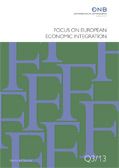Focus on European Economic Integration Q1/22
 OeNB
OeNB
- Erschienen:
- März 2022
 OeNB
OeNB
Call for applications: Klaus Liebscher Economic Research Scholarship (PDF, 52 kB) en 01.03.2022, 00:00:00
Euro adoption in CESEE: How do financial literacy and trust in institutions affect people’s attitudes? (PDF, 826 kB) Backé, Beckmann. We investigate how financial literacy and trust in institutions affect attitudes (expectations and preferences) regarding euro adoption in ten countries of Central, Eastern and Southeastern Europe (CESEE). Using recent evidence from the OeNB Euro Survey, we show that attitudes on euro adoption vary widely across and within countries. In our country sample, on average, 18% of the surveyed individuals would prefer a faster accession to the euro area than they expect, while another 18% would prefer a later euro introduction than they expect. The share of those whose expectations match their preferences is 22% in the overall country sample. 19%, on average, do not expect or wish euro area accession to take place at all. Finally, 23% indicate that they have not formed attitudes on the introduction of the euro in their respective countries. Computing an overall index of attitudes toward euro adoption, we show that financially literate individuals are more likely to form definite expectations and preferences and tend to prefer euro adoption to take place earlier than they expect. We further show that trust has a similar impact on the overall attitude toward euro adoption – with both trust in national and European institutions having a positive and significant impact on forming more accurately aligned expectations and preferences as well as on preferring the euro to be adopted sooner rather than later. en euro area accession, expectations, preferences, financial literacy, trust, CESEE D12, D84, E50, O52 01.03.2022, 00:00:00
Supplement to “Euro adoption in CESEE: How do financial literacy and trust in institutions affect people’s attitudes?” (PDF, 911 kB) en 01.03.2022, 00:00:00
Household savings in CESEE: expectations, experiences and common predictors (PDF, 741 kB) Koch, Scheiber. This study analyzes the link between household savings and adverse financial experiences as well as financial expectations. Using data from the 2019 OeNB Euro Survey, we focus our analysis on Central, Eastern and Southeastern European (CESEE) economies. Managing perceptions of the past and expectations about the future may be particularly crucial in countries where people have repeatedly experienced macroeconomic crises. Besides controlling for a rich set of individual characteristics in a standard regression framework, we also use a double LASSO regression analysis to test if detected effects are confounded by omitted variables. While people’s expectations about the economic situation in their country are positively related to the extensive margin of having savings and saving regularly, inflation expectations are negatively related to the amount people save regularly. Crisis experiences matter less but having experienced restricted access to one’s bank account discourages savings in general. Crisis experiences become more relevant if we restrict our analysis to older respondents and to savings during the COVID-19 pandemic in 2020, for which we have some data. The LASSO approach mostly supports our findings but also shows that neither crisis experiences nor expectations about economic or inflation developments are relevant predictors of the propensity to save regularly. It reveals, however, that trust in the national central bank is, among other things, a relevant predictor of savings behavior. en household finance, savings, survey data, LASSO, CESEE D14, D91, G51 01.03.2022, 00:00:00
Supplement to “Household savings in CESEE: expectations, experiences and common predictors” (PDF, 288 kB) en 01.03.2022, 00:00:00
The Belarusian banking sector (2016–2021): from timid recovery to renewed crisis? (PDF, 479 kB) Barisitz. Belarus’ aging economic system of centralized state capitalism, in which state-owned banks continue to play an instrumental role through government-directed lending to state-owned enterprises, has experienced a decade of sluggish growth punctuated by recessions (2015/16 and 2020). The system has been supported by subsidized energy deliveries from Russia, which, however, have been curtailed step-by-step in recent years. Belarus’ high trade and financial dependence on Russia implied that the oil price slide in 2014 to 2016 also pushed Belarus into recession. The ensuing recovery featured a degree of fiscal as well as monetary tightening (reduced directed lending, move toward inflation targeting), which cut inflation and somewhat reined in the high dollarization of deposits and lending. In 2020, stabilization tendencies were interrupted anew by the crisis triggered by the outbreak of the COVID-19 pandemic and political instability triggered by the brutal repression of demonstrations against the likely rigged presidential elections of August. While the recession of 2020 turned out to be quite mild in Belarus, Western economic and financial sanctions imposed in mid-2021 are likely to have an appreciable negative impact on the economy and banks from 2022. Given Belarus’ political isolation from the West, Russia’s external “lender of last resort” status looms even larger. en state capitalism, government-directed lending, soft budget constraints, evergreening, recapitalization, dollarization, quasi-fiscal activities, muddling-through strategies, sanctions E52, G21, G28, P34 01.03.2022, 00:00:00
Conference on European Economic Integration 2021: Recalibrating tomorrow’s global value chains – prospects for CESEE (PDF, 194 kB) en 01.03.2022, 00:00:00
Referees for Focus on European Economic Integration 2019−2021 (PDF, 70 kB) en 01.03.2022, 00:00:00